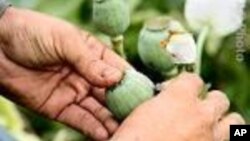Afghan police, supported by NATO forces, are about to begin a poppy eradication campaign in Afghanistan’s Helmand province. The operation is expected to target some twenty-two-thousand hectares of opium poppy, believed to provide about half the heroin now reaching Europe.
Mark Norton, a British counter-narcotics official involved in coordinating Western support for the operation, says that the poppies will be destroyed by hand and with tractors and all-terrain vehicles. Helmand’s governor Assadullah Wafa [ah-sah-dool-ah wah-fah] says he intents to conduct an aggressive eradication campaign throughout the province. To assist governor Wafa’s effort, says Mr. Norton, “we’ve purchased eighty tractors and harrows” to add to some thirty-seven already available to the governor’s office. “That will put one-hundred-seventeen tractors at his disposal to go out and eradiate,” says Mr. Norton.
The United Nations Office on Drugs and Crime reported that Afghanistan produced a record six-thousand-one hundred tons of opium during 2006. U.S. Under Secretary of State for Political Affairs Nicholas Burns says the spike in Afghan opium production is a “wake-up call”:
“The poppy production numbers in Afghanistan in 2006 were alarmingly high and they do indicate that there’s a major challenge underway for the future to try to wean the Afghan economy from this scourge of poppy production and its trafficking, which of course has ramifications not just for people inside the country, but in all the neighboring countries, in Russia and in Western Europe.”
Mr. Burns says that eradicating poppy is only one element of an effective counter narcotics program:
“There is the issue of crop substitution, alternative livelihoods because, of course, many of the people growing poppy do so because they badly need the money. These are poor people. And it’s the middlemen, that tend to make the most of the money from the trafficking business.”
During the past two years, the U.S. has spent more than three-hundred million dollars on developing alternative livelihoods for Afghan farmers. A portion of the more than ten billion dollars in aid President George W. Bush is asking Congress to appropriate for Afghanistan will be devoted to counter-narcotics programs.
Under Secretary of Nicholas Burns says the U.S. working with the Afghan government and other nations, will “redouble our efforts” to “reduce the amount of poppy cultivation and its trafficking.”




